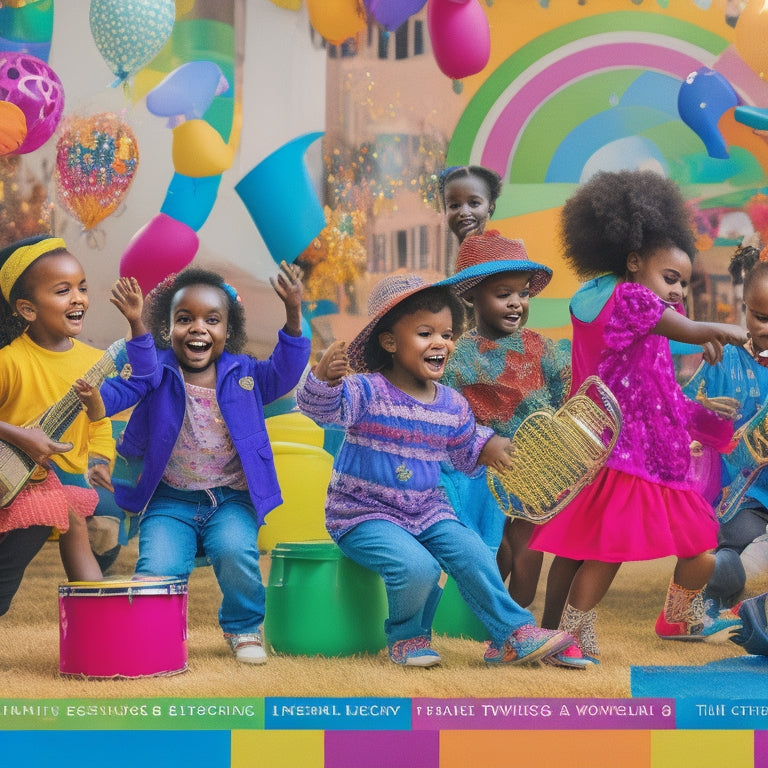
Music and Dance: Vital for Child Development
Share
Music and dance are essential components of a well-rounded childhood, providing a foundation for cognitive, social, and emotional growth. By embracing music and movement, children stimulate cognitive development, problem-solving skills, and memory, while fostering physical coordination, social interaction, and emotional expression. Additionally, music and dance nurture creative freedom, empathy, and cultural appreciation, broadening perspectives and encouraging self-expression. As we explore the multifaceted benefits of music and dance, we uncover the profound impact on a child's development, laying the groundwork for a lifetime of creativity, innovation, and emotional intelligence, and there's more to discover about the transformative power of music and dance.
Key Takeaways
• Music and dance activities enhance cognitive development, problem-solving skills, and memory, while fostering emotional expression and social interaction.
• Engaging in music and dance develops essential skills, including spatial awareness, social skills, emotional expression, and coordination.
• Music and dance provide a healthy outlet for emotional expression, encouraging children to communicate feelings effectively and develop empathy.
• Nurturing creative expression through music and dance empowers children to explore unique perspectives, fostering imagination, innovation, and self-expression.
• Music and dance activities promote teamwork, communication, and cultural appreciation, broadening perspectives and encouraging social skills.
The Power of Music and Movement
Moreover, embracing the power of music and movement in early childhood development can have a profound impact on a child's cognitive, social, and emotional growth, laying the foundation for a lifetime of creativity, self-expression, and confidence.
Music and movement stimulate cognitive development, enhancing problem-solving skills, memory, and language abilities. They also provide a healthy outlet for emotional expression, allowing children to convey feelings and thoughts through creative mediums.
Moreover, physical coordination and social interaction are fostered through dance and movement activities, promoting teamwork, communication, and empathy.
Benefits of Music and Dance
As children engage in music and dance activities, they develop a range of essential skills. From spatial awareness and social skills to emotional expression and coordination, they lay the foundation for a lifetime of creativity, self-expression, and confidence.
Music and dance foster cognitive development by enhancing problem-solving abilities and memory. Emotional expression is encouraged, allowing children to communicate their feelings effectively. Social skills are nurtured as children learn to collaborate and work together.
Physical coordination and balance are improved through movement and dance, contributing to overall physical development. By engaging in music and dance, children develop a strong sense of self, building confidence and self-esteem.
These benefits have a lasting impact, shaping children into well-rounded, creative, and empathetic individuals.
Nurturing Creative Expression
Through music and dance, children are empowered to explore and express their unique perspectives, cultivating a sense of creative freedom that fosters imagination, innovation, and self-expression. This artistic exploration allows children to develop emotional connections with others, fostering empathy and understanding.
| Benefits of Creative Expression | Outcomes for Children |
|---|---|
| Develops sensory awareness | Enhanced creativity |
| Fosters cultural appreciation | Broadened perspectives |
| Encourages self-expression | Increased confidence |
Frequently Asked Questions
How Can Parents Incorporate Music and Dance Into Daily Routines?
"Start the day with Morning Routines that incorporate gentle tunes and movement, and wind down with Bedtime Beats that soothe and calm, fostering a lifelong appreciation for the joy of music and dance."
What Are Some Fun Music and Dance Activities for Toddlers?
"Unleash the beat within! Engage toddlers in rhythm games, dance parties, and exploration of musical instruments. Host a Toddler Disco, and get them moving to action songs, fostering creativity and joy in these little ones."
Can Music and Dance Help Children With Special Needs?
For children with special needs, music and dance can provide therapeutic benefits, enhancing sensory integration and fostering emotional regulation, thereby promoting a sense of calm, confidence, and self-expression.
How Does Music and Dance Impact Children's Emotional Intelligence?
"Melodic murmurs manifest magnificent mood expression, as music and dance masterfully mold emotional regulation in children, fostering a harmonious habitat for healthy emotional intelligence to flourish, where feelings are freely expressed and empathetically understood."
Are There Any Specific Genres of Music That Benefit Child Development?
Research suggests that Classical music, with its soothing melodies and structured rhythms, can foster calmness and focus in children, while culturally diverse genres enrich their understanding and appreciation of global heritage, promoting empathy and inclusivity.
Related Posts
-

Wireless Bluetooth Speakers With the Longest Battery Life
If you're in the market for wireless Bluetooth speakers with the longest battery life, look for models boasting over ...
-

Budget-Friendly Tips for Printing Wedding Photobooks
To create a stunning wedding photobook on a budget, consider cost-effective printing options such as digital printing...
-

Dancers Delight: Stylish Wall Prints Available Now
Dancers Delight offers a curated collection of stylish wall prints that capture the essence of ballet, tap, and jazz,...


